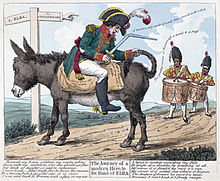
British etching from 1814 in celebration of Napoleon's first exile to Elba at the close of the War of the Sixth Coalition
Napoleon withdrew back into France, his army reduced to 70,000 soldiers and 40,000 stragglers, against more than three times as many Allied troops. The French were surrounded: British armies pressed from the south, and other Coalition forces positioned to attack from the German states. Napoleon won a series of victories in the Six Days Campaign, though these were not significant enough to turn the tide; Paris was captured by the Coalition in March 1814.
When Napoleon proposed the army march on the capital, his marshals decided to mutiny. On 4 April, led by Ney, they confronted Napoleon. Napoleon asserted the army would follow him, and Ney replied the army would follow its generals. Napoleon had no choice but to abdicate. He did so in favour of his son; however, the Allies refused to accept this, and Napoleon was forced to abdicate unconditionally on 11 April.

Napoleon's Villa Mulini on Elba
In the Treaty of Fontainebleau, the victors exiled him to Elba, an island of 12,000 inhabitants in the Mediterranean, 20 km off the Tuscan coast. They gave him sovereignty over the island and allowed him to retain his title of emperor. Napoleon attempted suicide with a pill he had carried since a near-capture by Russians on the retreat from Moscow. Its potency had weakened with age, and he survived to be exiled while his wife and son took refuge in Austria. In the first few months on Elba he created a small navy and army, developed the iron mines, and issued decrees on modern agricultural methods.The Allied Powers having declared that Emperor Napoleon was the sole obstacle to the restoration of peace in Europe, Emperor Napoleon, faithful to his oath, declares that he renounces, for himself and his heirs, the thrones of France and Italy, and that there is no personal sacrifice, even that of his life, which he is not ready to do in the interests of France.
Done in the palace of Fontainebleau, 11 April 1814.
0 comments:
Post a Comment